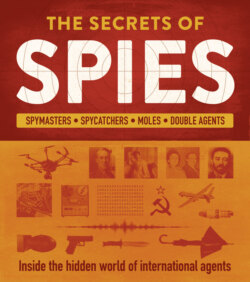Читать книгу The Secrets of Spies - Weldon Owen - Страница 41
На сайте Литреса книга снята с продажи.
ОглавлениеCHAPTER 2 | 1600s–1800s
42
INTELLIGENCE IN THE
ERA OF NAPOLEON
Like other national leaders, the French emperor Napoleon received a mass of
intelligence reports. He consequently faced the perennial problem of what to judge
as valuable information and what to discard as rubbish or outright disinformation from the
enemy. It was a conundrum he was never able to properly solve during a series of conflicts
with France’s neighbors, known in the English-speaking world as the Napoleonic Wars.
Napoleon Bonaparte, the most successful general of the
French Revolution, crowned himself Emperor of the French
in 1804. In doing so, he became the undisputed leader of
the most powerful country in Europe. With a large and
highly experienced army at his disposal, Napoleon
immediately began to prepare for war against his neighbors.
He also inherited an efficient intelligence service, but he
held ambivalent views about the importance of espionage,
often preferring to trust in his own military ability over
reports from his spies.
DECEIVING THE AUSTRIANS
For his first great campaign in 1805, which culminated in
the decisive defeat of a combined Austro-Russian army at
Austerlitz in 1805, Napoleon did rely on one of his more
audacious spies, Carl Schulmeister, a businessman and
smuggler from the Alsace region bordering France and
Germany. Schulmeister ostensibly worked for Austrian
intelligence, but he was in fact a double agent who had
offered his services to the French.
Schulmeister managed to persuade the
Austrians that French forces stationed in
southern Germany were on the point of
collapse. The Austrian commander in the
area, General Mack, advanced toward them in
anticipation of an easy victory, only to find his
troops surrounded by the main French army at
Ulm. Mack was forced to surrender, and the
Austrians never fully recovered from this setback.
SPIES IN THE FRENCH COURT
Later in his reign, Napoleon was less receptive to good
intelligence, whether from spies or decryption, and
by 1810, France had fallen behind Russia in intelligence-
gathering capability. The Russian Minister of War, Mikhail
Barclay de Tolly, had created an efficient black chamber.
Russia had been at peace with France since 1807, but by
1810, Tsar Alexander and his government were increasingly
fearful of a French invasion. Fortunately for them, they had
two spies at the heart of Napoleon’s court in Paris. Carl von
Nesselrode, deputy head of the Russian embassy, gained
detailed information on French strategic intentions. Prince
Alexander Chernyshev, the Tsar’s personal representative
to Napoleon, operated a ring of agents in the French
government. One agent
provided Chernyshev with a
monthly audit of the strengths
and positions of every unit in
the French army. Together, the
two spies gained a detailed
picture of French preparations
for the invasion of Russia in the
summer of 1812. The ensuing
military disaster was the
beginning of the end of
Napoleon’s empire.
Above: Prince Alexander Chernyshev
Below: Deceived Austrian general Karl Mack von Leiberich
was forced to surrender his force of 30,000 men to Napoleon
at Ulm after minimal fighting.
